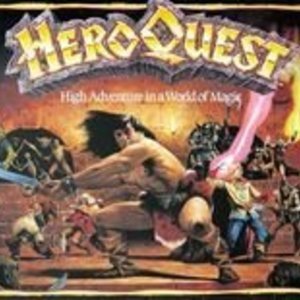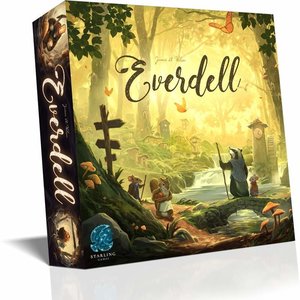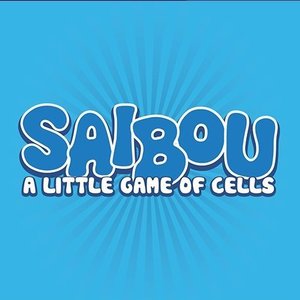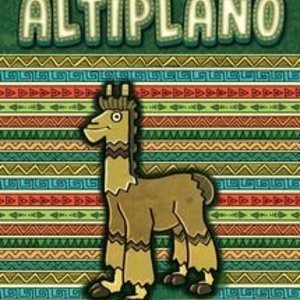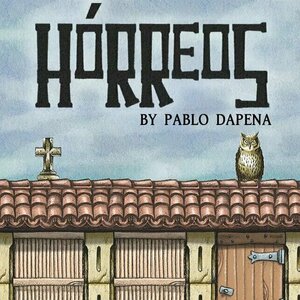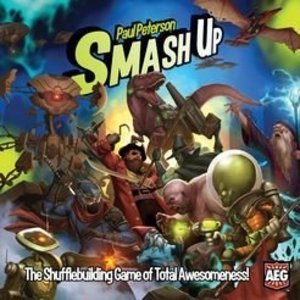Search
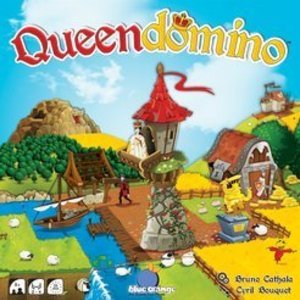
Queendomino
Tabletop Game
You are a royal, seeking new lands to expand your ever-growing kingdom. Explore and conquer the...
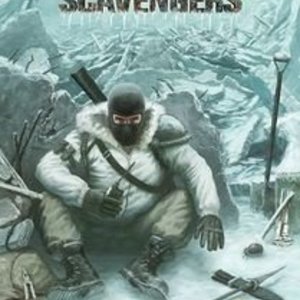
Arctic Scavengers
Tabletop Game
In the year 2097, the entire Earth was enveloped in a cataclysmic shift in climate, plunging the...
Purple Phoenix Games (2266 KP) rated Horreos in Tabletop Games
Jan 23, 2022
I’m not a huge history buff or anything, but I am definitely interested in my family lineage/ancestry. What does that have to do with this game? Well, with the last name Rodriguez, I’m sure you guessed that there’s some Spanish heritage in my background. My Dad will often talk about how our family originally came from Spain a loooooong time ago. Specifically from Galicia, Spain. So when I saw this ButtonShy game based on the real-life location of Galicia, my roots were calling to me and I had to get it. Hórreos gives us a small glimpse into life in 18th century Galicia – and it sounds pretty great!
Hórreos is a 2-player game in which players are competing to build the most effective and aesthetically pleasing hórreo in town. What is a hórreo? It is a building for storing grain, elevated from the ground to prevent rodents from infiltrating the structure. So in this game, players are building long and ornate hórreos that not only look stunning, but can keep the rats out of the grain! To setup for a game, each player receives 2 Action cards and the Hórreo cards are shuffled. The deck is placed between the players, and the top card is placed beside the deck to form a 2-card Market. The Leader card is placed beside the Market, facing the starting player. Pictured below is the setup for the beginning of a game.
Over a series of rounds, players will be taking 1 of 4 possible actions as they attempt to build the highest-scoring structure. Each player has 2 Action cards at their disposal. Each Action card has 2 possible Actions on it – one card is Sabotage or Plan, the other is Steal or Build. Both players will secretly choose whichever Action they wish to perform this turn, and place their card face-down in front of them. Players will then simultaneous reveal their chosen Actions, and they will be resolved in the following order – Sabotage, Plan, Steal, and Build. If a player has chosen to Sabotage, they will rotate their opponent’s Action card, forcing them to perform the other listed action this round. To perform the Plan action, the player will select one of the cards from the Market to be placed into their personal supply tableau. If you have chosen to Steal, you will select a card from your opponent’s supply, and take it into your own supply tableau. And finally, to Build is to move a card from your supply to your hórreo. Cards in your hórreo cannot be stolen. As with many other ButtonShy games, cards in your hórreo may be placed adjacent to, or even overlapping, previously played cards – cards may never be tucked under cards in your existing hórreo.
If both players have chosen the same action, the player with the Leader card facing them gets to decide which player will resolve their action first. The Leader card is then rotated to face the opposite player, and so on, for future ‘ties’. An important note – you cannot pick the same Action twice in a row, you must pick one of the other 3 Actions. So take that strategic tidbit into consideration when deciding what to do each round! The game continues in this fashion, with players selecting/simultaneously revealing Actions, resolving their Actions in order, and building their hórreo until there is 1 or fewer cards left in the Market and the players’ supplies at the end of a round. At that point, the game ends, points are tallied, and the winner is declared!
Points are scored in several ways. Most of the hórreo cards are ‘decorated’ with crosses and pikes, and each pair you have in your final hórreo will earn you points. Similarly, the number of doors in your hórreo, as well as adjacent pillars supporting your structure, will earn you points dependent upon the number (the more doors you have, the more points you earn, etc.). As mentioned earlier, you’re trying to keep these pesky rats out of your grain, so any rat pictured on your cards is worth -2 points, but each owl you have pictured eats (cancels out) one rat. And of course, whichever player has build the longest hórreo earns extra points. All points are tallied, and the player with the highest score is the winner!
I have to admit that Hórreos surprised me. The gameplay seems simple enough, so I honestly wasn’t really expecting a lot from this game. For such a small game, Hórreos is all about strategy. Each round, you only have 4 Actions from which to choose, and that really forces you to think long-term with your strategy. But at the same time, since Actions are revealed simultaneously and resolved in a set order, you have to consider what your opponent might do. For example, the Sabotage action forces the opposing player to use the other Action of their chosen card this round. Can you bluff your opponent into playing that Sabotage, forcing you to switch Actions, thus letting you perform the Action you really wanted to perform? That goes hand in hand with the fact that you cannot choose the same Action twice in a row. Can you anticipate your opponents moves to benefit your strategy? Or will you be out of touch, and thus be forced to essentially waste a turn performing an Action that you actually didn’t want to? And don’t forget the Leader card – if players both pick the same Action, the Leader can decide who resolves first. Maybe it’s strategically better to let your opponent resolve first, so then you can just negate what they just did, or vice versa.
To touch on components for a minute, this is a game of 18 cards in a wallet. So nothing out of the ordinary for ButtonShy. That being said, production quality is always top notch with these games, and I have no complaints. the cards are thick and sturdy, and the wallet is nice and supportive. The artwork is thematic and refreshing, while not being too overwhelming. Is it the most beautiful game I’ve ever seen? No. But it is aesthetically and thematically appropriate, and gives a serene and peaceful vibe. ButtonShy has yet to disappoint with their components, so I am definitely a big fan!
Hórreos is a pretty solid game. I’m not personally a huge fan of ‘take that’ type games, and there is an element of that in this gameplay. But there seems to be enough strategy needed to negate some of that direct competitiveness. The game itself is fast to teach, learn, and play, and that adds to the overall appeal. It’s not necessarily my favorite 2-player game, but it’s one that I can see myself pulling out often when I’ve got a quick minute between other games, or when I’ve got a little downtime. Purple Phoenix Games gives this one a structural 4 / 6. Check it out if you’re in the market for something small, yet strategic!
Hórreos is a 2-player game in which players are competing to build the most effective and aesthetically pleasing hórreo in town. What is a hórreo? It is a building for storing grain, elevated from the ground to prevent rodents from infiltrating the structure. So in this game, players are building long and ornate hórreos that not only look stunning, but can keep the rats out of the grain! To setup for a game, each player receives 2 Action cards and the Hórreo cards are shuffled. The deck is placed between the players, and the top card is placed beside the deck to form a 2-card Market. The Leader card is placed beside the Market, facing the starting player. Pictured below is the setup for the beginning of a game.
Over a series of rounds, players will be taking 1 of 4 possible actions as they attempt to build the highest-scoring structure. Each player has 2 Action cards at their disposal. Each Action card has 2 possible Actions on it – one card is Sabotage or Plan, the other is Steal or Build. Both players will secretly choose whichever Action they wish to perform this turn, and place their card face-down in front of them. Players will then simultaneous reveal their chosen Actions, and they will be resolved in the following order – Sabotage, Plan, Steal, and Build. If a player has chosen to Sabotage, they will rotate their opponent’s Action card, forcing them to perform the other listed action this round. To perform the Plan action, the player will select one of the cards from the Market to be placed into their personal supply tableau. If you have chosen to Steal, you will select a card from your opponent’s supply, and take it into your own supply tableau. And finally, to Build is to move a card from your supply to your hórreo. Cards in your hórreo cannot be stolen. As with many other ButtonShy games, cards in your hórreo may be placed adjacent to, or even overlapping, previously played cards – cards may never be tucked under cards in your existing hórreo.
If both players have chosen the same action, the player with the Leader card facing them gets to decide which player will resolve their action first. The Leader card is then rotated to face the opposite player, and so on, for future ‘ties’. An important note – you cannot pick the same Action twice in a row, you must pick one of the other 3 Actions. So take that strategic tidbit into consideration when deciding what to do each round! The game continues in this fashion, with players selecting/simultaneously revealing Actions, resolving their Actions in order, and building their hórreo until there is 1 or fewer cards left in the Market and the players’ supplies at the end of a round. At that point, the game ends, points are tallied, and the winner is declared!
Points are scored in several ways. Most of the hórreo cards are ‘decorated’ with crosses and pikes, and each pair you have in your final hórreo will earn you points. Similarly, the number of doors in your hórreo, as well as adjacent pillars supporting your structure, will earn you points dependent upon the number (the more doors you have, the more points you earn, etc.). As mentioned earlier, you’re trying to keep these pesky rats out of your grain, so any rat pictured on your cards is worth -2 points, but each owl you have pictured eats (cancels out) one rat. And of course, whichever player has build the longest hórreo earns extra points. All points are tallied, and the player with the highest score is the winner!
I have to admit that Hórreos surprised me. The gameplay seems simple enough, so I honestly wasn’t really expecting a lot from this game. For such a small game, Hórreos is all about strategy. Each round, you only have 4 Actions from which to choose, and that really forces you to think long-term with your strategy. But at the same time, since Actions are revealed simultaneously and resolved in a set order, you have to consider what your opponent might do. For example, the Sabotage action forces the opposing player to use the other Action of their chosen card this round. Can you bluff your opponent into playing that Sabotage, forcing you to switch Actions, thus letting you perform the Action you really wanted to perform? That goes hand in hand with the fact that you cannot choose the same Action twice in a row. Can you anticipate your opponents moves to benefit your strategy? Or will you be out of touch, and thus be forced to essentially waste a turn performing an Action that you actually didn’t want to? And don’t forget the Leader card – if players both pick the same Action, the Leader can decide who resolves first. Maybe it’s strategically better to let your opponent resolve first, so then you can just negate what they just did, or vice versa.
To touch on components for a minute, this is a game of 18 cards in a wallet. So nothing out of the ordinary for ButtonShy. That being said, production quality is always top notch with these games, and I have no complaints. the cards are thick and sturdy, and the wallet is nice and supportive. The artwork is thematic and refreshing, while not being too overwhelming. Is it the most beautiful game I’ve ever seen? No. But it is aesthetically and thematically appropriate, and gives a serene and peaceful vibe. ButtonShy has yet to disappoint with their components, so I am definitely a big fan!
Hórreos is a pretty solid game. I’m not personally a huge fan of ‘take that’ type games, and there is an element of that in this gameplay. But there seems to be enough strategy needed to negate some of that direct competitiveness. The game itself is fast to teach, learn, and play, and that adds to the overall appeal. It’s not necessarily my favorite 2-player game, but it’s one that I can see myself pulling out often when I’ve got a quick minute between other games, or when I’ve got a little downtime. Purple Phoenix Games gives this one a structural 4 / 6. Check it out if you’re in the market for something small, yet strategic!
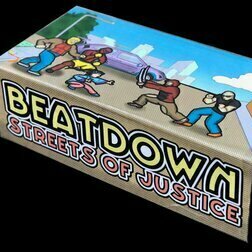
Beatdown: Streets of Justice
Tabletop Game
"Plan your combo. Save the city together. — A fun, cooperative, strategic crime-fighting card...
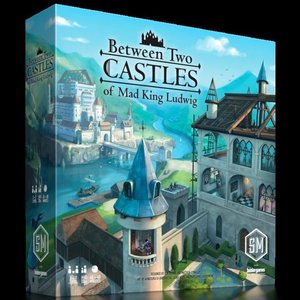
Between Two Castles of Mad King Ludwig
Tabletop Game Watch
The king demands a castle! You are a world-renowned master builder who has been asked by the Mad...
